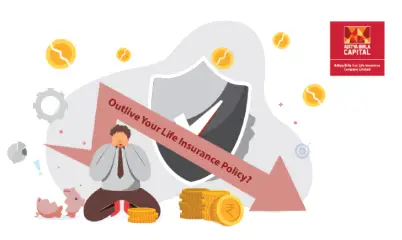Short Term Investment Plans
Get ₹11.69 lakhs4 lumpsum at maturity.
Features of Short-Term Investment Plans
Benefits of Short-Term Investment Plans
Things to Consider before Investing in a Short-Term Investment Plan
Latest Life Insurance Articles
-
Disclaimer
Tax benefits are subject to changes in tax laws. Kindly consult your financial advisor for more details
# Provided all due premiums are paid.
4 “Healthy male age 25 years investing in ABSLI Assured Savings Plan, premium paying term 6 years, policy term 12 years, payment frequency annually, Sum Assured Rs. 16.2 lakhs, Premium Rs. 1.2 lakhs/year excluding GST), you get Rs. 11.69 lakhs by age 37
ABSLI Income Assured Plan - This policy is underwritten by Aditya Birla Sun Life Insurance Company Limited (ABSLI). This is a traditional non-participating savings plan. (UIN: 109N089V06)
All terms & conditions are guaranteed throughout the policy term, except for the bonuses which would be declared at the end of each financial year. GST and any other applicable taxes will be added (extra) to your premium and levied as per extant tax laws. An extra premium may be charged as per our then existing underwriting guidelines for substandard lives, smokers or people having hazardous occupations etc.
ABSLI Savings Plan is a non-linked participating life insurance endowment plan (UIN: 109N088V02). Some benefits are guaranteed#, and some benefits are variable with bonuses based on the future performance of the participating business and economic conditions.
ABSLI Assured Savings Plan - This policy is underwritten by Aditya Birla Sun Life Insurance Company Limited (ABSLI). This is a Non-Linked Non-Participating Individual Savings Life Insurance Plan. All terms & conditions are guaranteed throughout the policy term. GST and any other applicable taxes will be added (extra) to Your premium and levied as per extant tax laws. An extra premium may be charged as per our then existing underwriting guidelines for substandard lives, smokers or people having hazardous occupations etc. All policy benefits are subject to policy being In-force. Customer Helpline Numbers: 1-800-270-7000 (Toll Free) between 10 am to 7 pm (UIN: 109N134V08).
For more details on risk factors, terms and conditions please read sales brochure carefully before concluding the sale.
ADV/4/24-25/11

 Home Loans
Home Loans
 Personal
Loans
Personal
Loans
 SME Loans
SME Loans
 Business Loans - Udyog
Plus
Business Loans - Udyog
Plus
 Loan against Securities
Loan against Securities
 Mutual Funds
Mutual Funds
 Stock and
Securities
Stock and
Securities
 Portfolio
Management Services
Portfolio
Management Services
 Pension Funds
Pension Funds
 Life
Insurance
Life
Insurance
 Health
Insurance
Health
Insurance
 Wellness
Solutions
Wellness
Solutions
 Pay Bills
Pay Bills
 Pay anyone
Pay anyone
 Pay on call
Pay on call
 Payment
Lounge
Payment
Lounge
 ABC Credit
Cards
ABC Credit
Cards

 1800-270-7000
1800-270-7000








